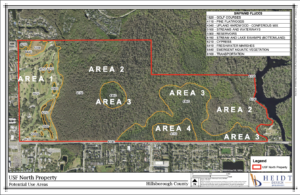Committee says USF Forest Preserve better suited for educational and research purposes

The North Fletcher Property Advisory Committee provided Interim President Rhea Law with recommendations on how to use the land Tuesday, deciding that the majority of it is not suitable for development.
Law also announced Tuesday in a universitywide email the university will not be pursuing any responses from the April Request for Information (RFI) for the North Fletcher Property and has ended the RFI process.
The university submitted the RFI on April 1 to gather interest from outside developers for potential future development of the property, raising concerns from the community.
In October, Law created the committee to evaluate an Ecological Assessment Report from civil engineering firm Heidt Design, identifying the ecological and physical conditions of the land as well as potential uses for it.
The report divided the 769-acre property into four sections. Area 1 is made up of the USF golf course The Claw, Area 2 is the riverine forest and Areas 3 and 4 are the forested upland habitat.
The committee decided areas 2, 3 and 4, which make up the USF Forest Preserve, are not suitable to be developed on for residential, commercial or retail use due to their ecological classification. These areas are mostly made of wetlands and uplands, according to the ecological report.
However, the committee recommended areas 2, 3 and 4 be leased to the university by the Board of Trustees for teaching and research purposes as well as outreach opportunities, which could also result in wetland mitigation.
It also said the College of Arts and Sciences should be designated to oversee an outdoor shared-use facility made up of the three areas. Research and teaching facilities on the land for natural and cultural resources and to support the integrity of research efforts would provide an enhanced learning experience and promote conservation, according to the committee.
A facility manager and advisory body for the Forest Preserve would be needed to create and implement a management plan for the facility, the committee said. All activities done at the facility would need to be shared with the university president and provost annually outlining improvements, expenditures, maintenance and revenue generated.
The committee said it recognizes that the remaining area, which is made up of the golf course, could impact the environmental sensitivity of the adjacent land if developed on.
“Of particular concern are effects on the hydrology of the adjoining areas, i.e., surface and groundwater connections that may result in degraded water quality and compromised water security for the broader Tampa Bay region,” the committee said.
The reported presence of archeological sites on the North Fletcher Property is something the committee said it recognized, and as a result it encouraged discussions to take place with appropriate authorities.
The committee said it recommends working on projects that are financially sensible and keep in line with the university’s own values, and also keep in mind the quality of the developments so it can ensure certain needs for future generations are met.







